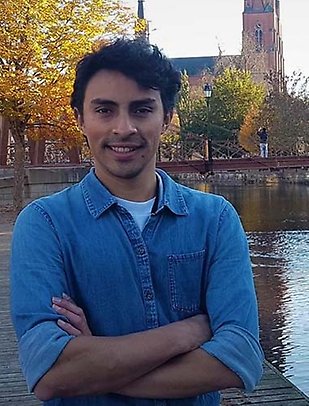Is this programme right for you?
Department of Earth Sciences
Over 2 500 students study at the Department every year, on Bachelor levels and Master level as well as PhD studies.

Meet a student on the programme
Name: Aaron Sediles
From: Colombia
I want to use my professional career to contribute to a more sustainable society, either with the creation of my own company in the future or by working for a company with sustainability as a main value.
How did you choose your programme?
– I found the programme in the Erasmus Mundus Joint Master Degree catalogue. I picked it because it helps me use my background in geology to pursue my goal of helping the world progress to a more sustainable society, and also because it gives the opportunity to receive teaching from three world renowned universities.
What is it like to be an international student?
– It is a never-ending journey of learning and discovery, sometimes easy sometimes challenging. You get exposed to so many things you were not used to, food and people from different parts of the world, different ways of thinking, or languages you don’t understand. Even simple things as transportation or payment in a shop can be new. It is very edifying and gratifying.
What is the best thing about studying at Uppsala University?
– Let’s start with the location. Sweden is beautiful and there are many places to experience during all the seasons. Additionally, the education system is built in a way in which you get to dedicate time to understand what you are learning and shape your learning together with the teachers and classmates.
How did you experience your first few days in Sweden?
– I arrived in Sweden during winter. I embraced the charm that snow gives to the landscape and escaped the cold by being active skating on the ice, and of course, by eating lots of that special kind of sweet bun I found that time of the year called "Semla".
Describe what a normal day is like for you?
– In the area I lived in Uppsala which is near the forest, it is normal to see things like squirrels jumping from branch to branch in front of your window or deer roaming around. When I’m not studying, I spend my time outside, going for a run or a bike ride surrounded by nature, or just enjoying the beautiful city I live in. Now I live in Visby (Gotland) and even if the place feels emptier and windier, it is very beautiful and peaceful.
What is something unique about your programme?
– The programme is very international, and is taught by three universities. The particular combination of the expertise of the universities is beyond compare and every partner university is the best in their field. Learning from all of them is just priceless.
How would you describe the relationship between you and your teachers at the university?
– Uppsala University teachers/professors make you feel comfortable from the beginning, they are very approachable and very responsive to your feedback, and you get to experience class in a friendly environment where you can really focus on your learning.
What is your reason for studying and your ultimate goal?
– I want to use my professional career to contribute to a more sustainable society, either with the creation of my own company in the future or by working for a company with sustainability as a main value. With this in mind and also thinking that I want to be as good as I can at what I do, I found the SINReM programme as the next step to forge my career.
What is your best experience so far?
– I would highlight two things: Firstly, the gift of having classmates from all over the world that turned into really valuable friends, and secondly the opportunity to experience amazing places, from castles and buildings from medieval time, to the Swedish north past the arctic circle, where I got to see the northern lights for the very first time in my life.
Fall 2021.
Contact
- For programme-specific information, please contact our study counsellor:
- studievagledare@geo.uu.se
- For admissions-related or general information, please contact our applicant support team:
- masterprogrammes@uu.se
